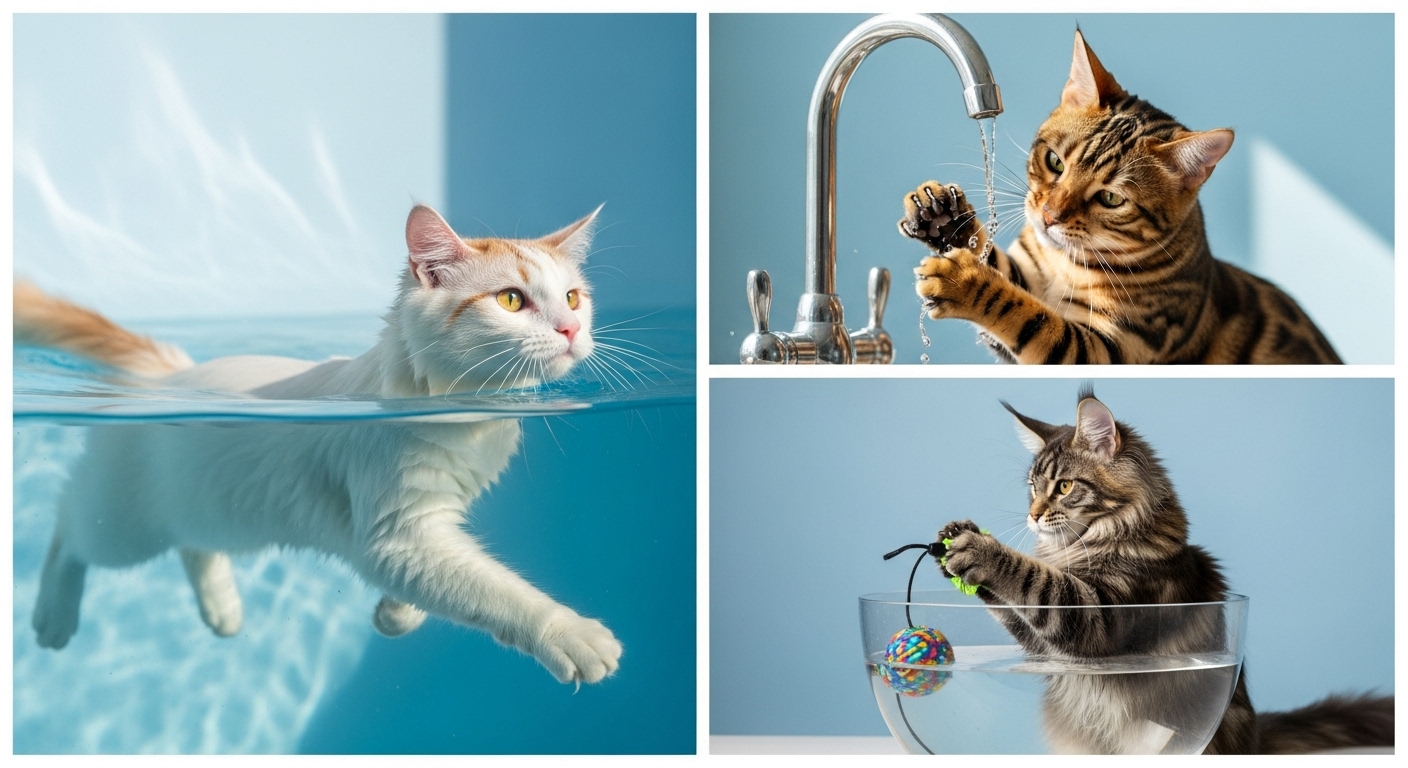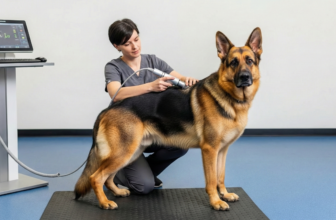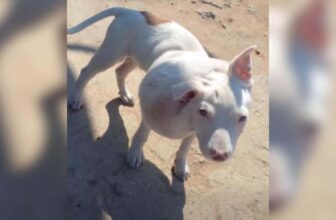
Check out our latest products
Most people picture cats as creatures who avoid water at all costs — darting away at the first sign of a dripping faucet or bath. Yet, not all felines fit that stereotype. Some cat breeds genuinely enjoy water, whether it’s playing with it, drinking from a running tap, or even swimming. These unique cats defy expectations, blending natural curiosity with confidence and a touch of adventure.
In this guide, we’ll explore why certain cats like water, the breeds most known for their aquatic tendencies, and how to introduce your cat to water safely.
Why Most Cats Dislike Water
To understand why some cats love water, it helps to know why most don’t. Domesticated cats descended from desert-dwelling ancestors, meaning they evolved in dry climates where swimming or bathing wasn’t necessary for survival. Their thick fur also absorbs water easily, making it uncomfortable and slow to dry.
Additionally, cats are naturally cautious about unfamiliar sensations and sounds — and splashing water can feel unpredictable. However, selective breeding and early socialization can change that. Certain breeds have inherited genes or traits that make them more tolerant — even enthusiastic — about water.
Why Some Cats Love Water
Water-loving cats often share a few key traits:
- Curiosity and intelligence: Breeds that love exploration often enjoy playing with water.
- Adapted coats: Some have semi-water-resistant fur that dries quickly.
- Ancestral environment: Breeds with roots in coastal or wet regions developed comfort around water.
- Early exposure: Cats introduced to water as kittens are more likely to enjoy it later.
Now, let’s meet the stars of the feline world who actually like to get wet.
1. Turkish Van
Origin: Turkey
Size: Medium to large (9–18 lbs)
Personality: Adventurous, affectionate, playful
The Turkish Van is famously known as the “swimming cat.” Native to the Lake Van region of Turkey, these cats developed a fondness for water in their natural environment. Their semi-long, cashmere-soft coat is water-resistant, and they often enjoy splashing, swimming, or dipping their paws in bowls. Turkish Vans are active and intelligent, requiring stimulation and space to explore.
Their love for water often extends to the bathtub, so don’t be surprised to find one joining you during a shower!
2. Bengal
Origin: United States (hybrid of Asian Leopard Cat)
Size: Medium to large (8–15 lbs)
Personality: Energetic, intelligent, confident
Bengals are one of the most athletic and curious cat breeds. Their wild ancestry gives them a fascination with running water — they often paw at faucets, jump into sinks, and even play in puddles. Their short, sleek coat is easy to dry, which adds to their comfort around water.
Because of their high energy, Bengals benefit from interactive play involving water, such as shallow pools or fountain toys that engage their hunting instincts.
3. Maine Coon
Origin: United States
Size: Large (10–25 lbs)
Personality: Friendly, gentle, curious
The Maine Coon’s dense, water-resistant coat and tufted paws make it well-adapted to wet, snowy environments. They were historically farm and ship cats, accustomed to the outdoors and varying conditions. Many Maine Coons enjoy dipping their paws in water bowls or watching running faucets. Their fascination with water often pairs with their playful, intelligent nature.
Despite their size, Maine Coons are gentle giants who love companionship and environmental enrichment — including supervised water play.
4. Abyssinian
Origin: Ethiopia (formerly Abyssinia)
Size: Medium (8–12 lbs)
Personality: Active, curious, affectionate
Abyssinians are among the most intelligent and inquisitive cat breeds. Their curiosity often leads them to explore water, especially moving water sources like taps or fountains. Some Abyssinians even enjoy splashing in shallow water dishes.
Their short, fine coat dries quickly, and their athletic build makes them agile and fearless. Abyssinians thrive in interactive environments where they can climb, play, and yes — occasionally get a little wet.
5. Savannah Cat
Origin: United States (domestic cat × Serval hybrid)
Size: Medium to large (12–25 lbs)
Personality: Bold, loyal, high-energy
Savannah cats are adventurous and strong swimmers. Their Serval ancestry gives them a natural fascination with water and an instinct to explore. Savannahs often play with running taps, wade in shallow pools, or even swim. They require a great deal of exercise and stimulation to stay happy and healthy.
Because of their athleticism and love of exploration, many owners set up supervised water play areas or safe shallow tubs for them.
6. Turkish Angora
Origin: Turkey
Size: Medium (7–12 lbs)
Personality: Graceful, intelligent, affectionate
Elegant and refined, the Turkish Angora is another breed from Turkey with a surprising love of water. Their fine, silky coat is easier to dry than that of most long-haired breeds. Angoras are intelligent, playful, and social cats who enjoy exploring their surroundings — water included. They may play with faucets, paw at their water bowls, or follow their owners into the bathroom just to see the action.
7. Norwegian Forest Cat
Origin: Norway
Size: Large (10–22 lbs)
Personality: Calm, confident, affectionate
The Norwegian Forest Cat evolved in cold, wet climates, developing a thick, water-repellent double coat. These cats are built for the outdoors and often show curiosity toward water. They might paw at streams or fountains but are less likely to fully swim compared to breeds like the Turkish Van.
They are calm and friendly companions who enjoy exploration, making them excellent for owners who appreciate interactive play and light water enrichment.
8. Manx
Origin: Isle of Man
Size: Medium (8–14 lbs)
Personality: Loyal, playful, intelligent
The Manx, a tailless breed from the Isle of Man, developed near coastal environments and is naturally comfortable with water. Known for their playful temperament and strong hind legs, many Manx cats enjoy splashing in shallow water or drinking from taps.
Their curious nature and easy-going temperament make them great candidates for supervised water play. Regular interaction and mental stimulation keep them content and prevent boredom.
9. Siamese
Origin: Thailand
Size: Medium (6–12 lbs)
Personality: Vocal, social, intelligent
Siamese cats are curious about everything their humans do — including bathing. While not all Siamese cats swim, many are fascinated by water. They often paw at faucets, watch water run, or play with drops in the sink. Their sleek, short coat makes them comfortable in slightly damp conditions. Siamese cats thrive on social interaction, so water playtime can become part of their bonding routine.
10. Japanese Bobtail
Origin: Japan
Size: Small to medium (6–10 lbs)
Personality: Active, playful, social
The Japanese Bobtail is famous for its distinctive short tail and outgoing nature. These cats are energetic, love interactive toys, and often enjoy playing with water. In Japan, they’re considered symbols of good luck and prosperity. Bobtails may not swim as frequently as Turkish Vans, but they adore splashing in shallow dishes or joining you while you fill the sink.
Tips for Encouraging Cats to Enjoy Water Safely
If you have a curious cat that shows interest in water, you can encourage safe exploration with a few precautions:
- Start slowly: Introduce water play in small doses. Begin with damp toys or dripping faucets.
- Use shallow water: Fill only an inch or two of lukewarm water in a basin.
- Never force your cat: Let them approach water on their own terms.
- Offer positive reinforcement: Use praise or treats to create positive associations.
- Provide cat fountains: Running water encourages hydration and curiosity.
- Ensure safety: Never leave your cat unattended near deep water or full tubs.
- Keep the environment calm: Avoid loud splashing or sudden movements that could startle your cat.
Building trust is key. Cats that feel safe and curious are more likely to enjoy light water interaction.
FAQs About Cats That Like Water
Do all cats that like water actually swim?
No. Some cats simply enjoy playing with water or pawing at running faucets, while others — like the Turkish Van — may swim. Comfort levels vary by individual.
Can I bathe my cat if it likes water?
You can, but only when necessary. Cats generally groom themselves effectively. If bathing is required, use cat-safe shampoo, lukewarm water, and gentle handling.
Is it okay to let my cat play in a pool?
Not unless it’s supervised and very shallow. Chlorine or pool chemicals can irritate a cat’s skin and eyes. Always rinse your cat afterward and ensure there’s an easy way out.
How can I tell if my cat enjoys water?
Cats that approach sinks, paw at water, or play near faucets likely have a positive association. Always let them lead — never force contact with water.
Are water-loving cats rare?
Yes, but not unheard of. While most cats avoid water, certain breeds — and even individuals outside those breeds — enjoy it due to genetics and early experiences.
Final Thoughts
While the stereotype says cats hate water, many breeds defy the myth. From the adventurous Turkish Van to the playful Bengal and affectionate Maine Coon, these felines bring curiosity and fun to water activities. Their unique coats, confidence, and intelligence make them stand out among domestic cats.
If you’re considering adopting one of these breeds, remember that every cat is an individual. Not all Turkish Vans swim, and not all Siamese will play in the sink. Introduce water slowly, ensure a safe environment, and respect your cat’s comfort level. With patience and care, water play can become a rewarding part of your feline’s enrichment routine.
Post Views: 25
Animal Wellness is North America’s top natural health and lifestyle magazine for dogs and cats, with a readership of over one million every year. AW features articles by some of the most renowned experts in the pet industry, with topics ranging from diet and health related issues, to articles on training, fitness and emotional well being.



![[PETHROOM] Cat Nail Clipper Trimmer for Indoor Cats with Circular Cut Hole (2mm) | Premium Sturdy Stainless Steel Blade Cat Claw | Safe, Easy, Accurate, Quiet & Fast | Avoid Overcutting](https://m.media-amazon.com/images/I/6156hi88deL._AC_SL1298_.jpg)
![[PETHROOM] Professional Eye Comb for Pets | Stainless Steel Tear Stain Remover for Cats & Dogs | Gentle Round-Head Grooming Tool | Compact & Portable for Eye Gunk Removal](https://m.media-amazon.com/images/I/71+W758uwXL._SL1500_.jpg)









